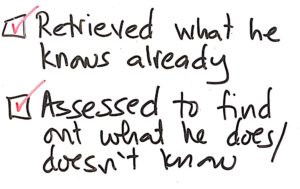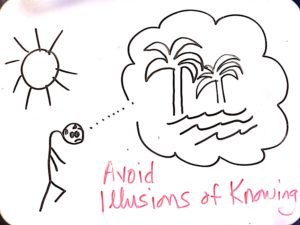When you study, do you often FEEL as if you’re ready to take the test? You re-read the notes or chapter and think, “I got this!” Only to discover that actually — you didn’t know it as well as you thought?
Recently a client of mine had a similar issue, and so we made a study plan that helped him avoid what some authors call “illusions of knowing.”
Check out what we discussed here!
Hey there, don’t have time for the full video? Don’t worry I’ve got your back, here’s a summary:
The other day I had a fascinating session with a client. We were working on preparing for his finals, and we were talking about electron configurations and chemistry. To do this I was having him write everything he knows about electron configuration on his whiteboard, and then review with his textbook and notes what he got right/wrong and what he didn’t even know.

Then he made a VERY insightful comment. He said, “Oh my gosh, I thought I knew it better than I actually knew it.” In turn, I asked him if he’d not studied the way we just did, would he have realized he didn’t know it that well, and he replied, “Oh no, I totally wouldn’t have. I would have been reading it [in the textbook] and been saying, oh yeah I totally know that.” And this is something that neuroscientists talk about, referred to as illusions of knowing.

An illusion of knowing is when we think we know something, but we don’t actually know it. So it’s important that when you are studying, you create PROOF of what you know.
Avoiding illusions of knowing is just the tip of the iceberg. If you’d like practice and tons more tips on how to study effectively and efficiently, you can learn about that by clicking here.
